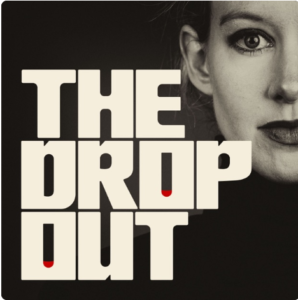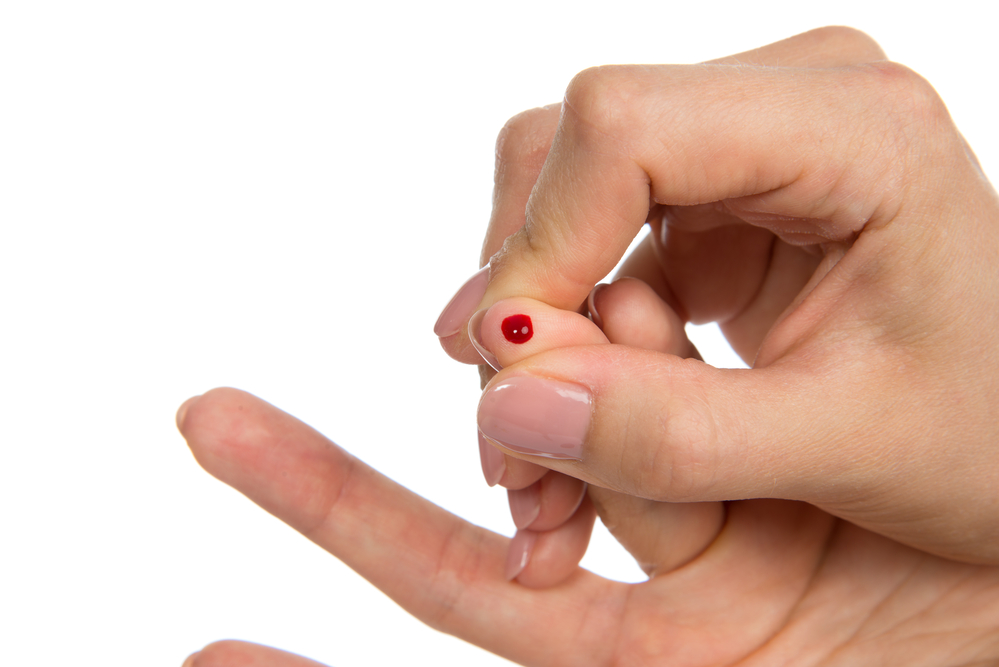John Carreyrou’s book about the rise and fall of Elizabeth Holmes and Theranos is so comprehensive, it’s hard to imagine what a podcast covering the same material could add. (You can read my first post on Carreyrou’s book here.) But the first thing we hear in the first episode of the ABC News podcast, The Dropout, is an audio clip from Holmes’s deposition.

And that means we hear Elizabeth Holmes’s voice.
Holmes’s voice is a consistent theme in Carreyrou’s book, significant enough to have its own entry in the index. In public interviews and in her deposition, Holmes’s voice is a startlingly deep baritone. Carreyrou, and others who have worked and spoken with her, say that this is a pretense. Holmes’s natural speaking voice is more traditionally feminine and higher-pitched. The baritone is something she adopted to sound more authoritative and more powerful.
Any woman in the business world can sympathize with the difficulty of being taken seriously–particularly when one has a quiet, high, “girlish” voice. But Holmes’s baritone and the long pauses she uses either for emphasis or in order to keep her voice in this lower register combine with what we now know about the level of deception practiced by Holmes and her company to emphasize just how deeply her duplicity ran.
It is a voice we hear a lot over the six episodes of The Dropout.
The first episode is dedicated to the young Elizabeth Holmes who, from childhood, had wanted to invent something big and to change the world. Everyone’s favorite childhood anecdote about Holmes involves her drawing involved plans for a time machine at age 7. It sets the stage for her as a person with big dreams and a sense she could accomplish anything. But the second anecdote everyone tells about Holmes. A relative asks her what she wants to be when she grows up, and she says: “A billionaire.”
It would be unkind to base our understanding of anyone’s character on their childhood answers to questions like this. (I wanted to be a ballerina, after all.) But since we know how the stories of Holmes and Theranos have evolved, it is hard to remember that, and hard not to read her ferocious ambition directed towards nothing more specific than the accumulation of wealth, as the source of so many problems.
Episode one interviews some of Holmes’s high school teachers and her professors at Stanford. When Holmes was introduced to Phyllis Gardner, a professor of medicine. Gardner found her unimpressive, “It was just a 19 year old talking, who had taken one course in microfluidics, and she thought she was going to make something out of it.” With a chilly reception from Gardner, Holmes sought a mentor in the engineering department–Channing Robertson. Robertson became very involved in Holmes’s goals, introducing her to venture capitalists, and becoming a director of her nascent company. He compared her to Mozart, Beethoven, Newton, and Einstein.
While Holmes had trouble getting funding from those with medical and pharmaceutical experience, venture capitalists with more generalized interests were excited by her dream of radically changing the world of blood testing. Donald Lucas Sr., who originally backed Oracle, is another voice we hear in the first episode of the podcast. He notes his initial skepticism about this 19 year old Stanford dropout with a big idea, but then notes that her great grandfather was an entrepreneur and the hospital in her area was named after her great uncle, “so she came by the two things that were necessary here–one medicine, and the other entrepreneur–quite naturally. And she was attractive, too.” Hearing Holmes’s staged baritone helps cement her dishonesty for podcast listeners. In much the same way, hearing Lucas marveling at Holmes’s mystic bloodline of medical innovation as well as her blonde beauty helps us understand how Holmes got so much money so early with so little to go on.
She had a great story.
But great stories don’t make great companies. Neither does hiring designers from Apple to make an impressive looking case, nor does redesigning Holmes’s own personal style to mimic that of her idol, Steve Jobs.
At the end of episode one, we learn that Holmes had arranged for Theranos to be allowed to test its technology on 3rd and 4th stage cancer patients. The machines didn’t work, and the data was corrupted. The tests were just for research purposes, and were not used for diagnostic and treatment purposes. But Theranos employees did not know that. We also learn that Avie Tevanian, Steve Jobs’s right hand man who had left Apple to serve on the board of Theranos had been invited to resign for “asking too many complicated questions.”
The ever growing level of secrecy and dissimulation at Theranos is the focus of episode two.
In this episode, Sunny Balwani enters the story. With Theranos rapidly running through its initial investment capital, and having trouble getting funding, Holmes sought loans from other sources. Balwani, who had known her since the summer before she went to college, gave her a 13 million dollar interest free loan. And he came on board to Theranos as the president and CEO. With no background in science, and with an abrasive and threatening personality, Balwani seems to have been immediately a source of tension and fear among Theranos employees.
What employees and investors did not know, however, was that Holmes and Balwani were romantically involved. The relationship may have been kept under wraps because Sunny originally met Elizabeth when she was 18 and he was 37, or because investors would have disapproved of Sunny’s involvement in the company if the relationship had been public, or to try to burnish Elizabeth’s mystique as the driven founder with no passions other than her start up. Whatever the reasons, it was never disclosed.
Holmes and Balwani worked closely together to persuade Walgreens to adopt Theranos technology for lab testing. They told executives that the technology was “viable and consumer ready” and had been validated by the FDA, and was used by the US military. None of this was true. When Walgreens brought outside experts into Theranos headquarters to review the technology, Balwani’s extensive security was on display, but nothing else was. Experts were not allowed to see the lab or speak with anyone but Holmes and Balwani. And when they asked to run blood tests on the Theranos tech and at an outside lab in order to compare results, Holmes and Balwani refused. In the podcast one expert comments. “I never saw anything that would indicate that the machine would do anything at all…I never got it to do anything.”
Theranos’s claim to be able to perform more than 250 lab tests on a single drop of blood was nothing but fiction.

Yet, Walgreens agreed to a deal with Theranos. By 2015 there were 41 Theranos wellness centers in California and Arizona, and they seemed poised to roll out across America.
The increasing prominence of Theranos, and the prospect of Theranos and its non-existent technology becoming a major–perhaps the major–source of lab test results in the nation, began to horrify and frighten employees. Ian Gibbons, a biochemist at Theranos, worked in the labs, trying to make Holmes’s and Balwani’s outsized promises come true. Unable to make the technology work (and as the podcast proceeds, one wonders if anyone could), he spoke in confidence with Channing Robertson–that supportive Stanford professor who compared her to Beethoven–and was fired the next day. He was rapidly hired back but demoted to HR work. At the same time, Ian Gibbons had been subpoenaed to appear in support of Theranos in a patent dispute. He did not want to testify because it would have required either perjuring himself or revealing that the Theranos tech didn’t work.
Ian Gibbons committed suicide before the court date.
Beginning episode one with the voice of Elizabeth Holmes allows listeners access to the vocal change that is a part of her extensive deceptions. Closing episode two with the voice of Rochelle Gibbons, telling her husband’s story and dissolving into anger and anguish when discussing his death makes very real the very human costs of the games being played by Holmes, Balwani, and Theranos.
And yet, there seemed to be no end to their rise.
Next time: Episodes 3 and 4


READER COMMENTS
Phil H
Aug 15 2020 at 12:19pm
“It would be unkind to base our understanding of anyone’s character on their childhood answers…”
Yes, so don’t include them!
This series is great, and interesting. Also a refreshing change, ona website that usually chronicles the way government goes wrong, not private business. But gossipy details about childhood really don’t add anything.
Sarah Skwire
Aug 15 2020 at 1:40pm
Hi Phil-
I’m so glad you’re enjoying the series! I agree. It’s extremely important for those of us who like and support free markets and market tested innovation to be among the loudest and most vociferous critics when people or companies behave fraudulently.
JFA
Aug 15 2020 at 1:54pm
I dunno… narcissistic behavior can manifest early… so can sociopathic or psychopathic tendencies…. if I learned that a kid tortured animals for fun, I have probably learned something about what the kid will be like as an adult.
AlexR
Aug 15 2020 at 11:21pm
I found the anecdote from Holmes’s childhood to be both interesting and worthy of the telling. When I was asked that same question in kindergarten, I answered that I wanted to be an engineer when I grew up. By that I meant the guy who drives the choo-choo train. Out of a survey of a thousand children, how many would say billionaire? Zero, I think.
Professor Skwire, many thanks for your deeply insightful and entertaining essays. We need more Skwirean wisdom in economics!
Dylan
Aug 17 2020 at 7:57am
Ha! I said the same thing at the same age, but by engineer I meant chemical engineer. Pretty sure I thought a chemical engineer mixed together test tubes of chemicals and made things explode, which seemed pretty cool. However, I was always disappointed that all my peers (and generally quite a few teachers) thought I meant I wanted to be the guy that drove the train.
AMT
Aug 17 2020 at 2:16am
Phil,
There is a pretty big difference between BASING your understanding of one’s character on a childhood anecdote, and including it as an additional piece of evidence to support a conclusion.
Robert EV
Aug 16 2020 at 1:04pm
RE: “Holmes’s voice is a startlingly deep baritone.”
The interviewer in the first couple of seconds of the video on this page ( https://www.thelily.com/of-all-the-weird-things-about-elizabeth-holmes-the-weird-voice-makes-the-most-sense/ ) sounds like a middle of the road baritone (if he sang), while Holmes sounds higher (tenor-range contralto?).
I don’t have a vocal frequency analyzer though (and even Sopranos and Basses overlap in their ranges), and am no expert on music/voices.
Robert EV
Aug 16 2020 at 1:30pm
Compare to Juliana Strangelove, a person who seems to my untrained ear to be a genuine baritone-range contralto: https://youtu.be/s9Em80GzksQ?t=180
Robert EV
Aug 16 2020 at 3:01pm
Great synopsis though, thank you. I prefer reading to listening.
Comments are closed.